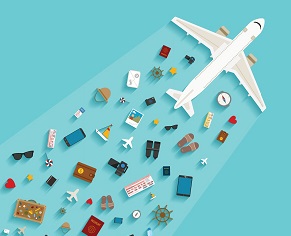There is a significant opportunity for airline marketers to use technology to drive customer loyalty and improve customer service, according to new research.
The study, from European data management provider Relay42 and EyeForTravel indicayes that nearly 40% of respondents put a premium on brand differentiators, such as service quality and in-flight experience.
Key findings:
● 40% of UK consumers place a premium on brand differentiation
● Majority of respondents found technology made airline service better
● But airline marketers need to be careful how they use technology
Set against the backdrop of 42.5% saying technology made airline service “slightly better” and 34.7% saying it made it “significantly better” there is a clear opportunity for technology to play a positive role in adding value, but airlines need to think carefully about how they employ it. Only one fifth of respondents felt technology had influenced their direct communications with carriers for the better and 46% said they would very much prefer an airline that enabled consumers to fully manage communications channels.
The survey validates the widely accepted belief that consumers, particularly leisure travellers, still rate convenience (26%) and price (25%) as the two most important factors when choosing a flight. However, innovative airlines have an opportunity to drive competitive advantage if they use technology to market more effectively to consumers. In particular it is clear customers yearn for practical information rather than sales offers or recommendations:
● 57% of consumers would like mobile or email communication on waiting times at check-in and security
● 48% would like information about travel options to and from their final destination
● 36% would like information on activities that they could book
● 35% would like information on accommodation that they could book
● 30% would like information on suggested destinations based on previous travel
“Our survey shows technology could have a very positive impact on the way airlines market to their customers especially if they are prepared to dial down the sales messages,” said Tomas Salfischberger, CEO and co-founder, Relay42. “Airlines, such as our customer KLM, are already showing how digital technologies can be adopted to enhance the service they offer to customers. The winners will be those that listen carefully to what customers want and use the information they have about customer behaviour to enrich the services they provide.”
There was a warning for airline marketers; in their current form less than one fifth of consumers felt technology had influenced their direct communications with carriers for the better. It is critical for airlines to consider how they can deploy technology to offer the practical information that consumers want. This will show a much deeper understanding of their customers’ needs and help to drive value, which will result in improved customer engagement. The survey respondents were quite specific in where they saw technology adding the most value:
● 52.6% of respondents thought it had made their journey easier
● 46% said it had been valuable at check-in
● 37.9% thought that technology had made life easier when paying for a flight
● Only 19.6% regularly book flights via smartphones, and 23.8% say they search for flight information on their phones, but do not go through the booking phase
“Every carrier is facing the same competitive pressures, which makes it even more important to find new ways to differentiate your brand,” added Florent Coudyser, Head of Travel, Relay42. “The good news is that digital technologies can be quickly implemented. However, carriers need to be methodical and strategic in their approach. If individual applications are not integrated it will create a disjointed picture of customers, which will lead to frustration not stronger customer engagement.”
The survey, conducted between 17th and 24th August 2016 among 1,795 consumers also ranked the leading airlines for their customer service. Unsurprisingly the long-haul airlines continue to rank best and the low cost airlines are still dealing with the perception of lower value services. Among the well-known airlines in the UK where the number of respondents was statistically more significant Emirates ranked the best airline, with British Airways holding off easyJet and Ryanair. This is despite its August announcement to reduce free meals on long-haul flights for economy passengers. Within the report there were also some positive examples of the way forward. KLM also ranked highly and has been a leading innovator in digital services in the airline industry. For instance, it became the first to offers its customers around the world booking and check-in confirmation, boarding pass and flight status updates via Facebook Messenger.
“With the rise of ad blockers and people increasingly wary of digital ads, those customers who opt-in to your communications are incredibly valuable and you need to treat them as such,” said Alex Hadwick, Head of Research at EyeforTravel. “If a consumer downloads an airline app, then it is a rare moment of complete attention. Therefore make sure they see the value you add at that moment through making their journey easier, more fun or more comfortable. Our survey showed consumers were interested in technology but it needed to be functional and relevant.”

